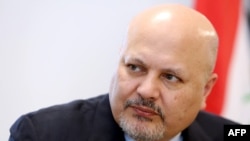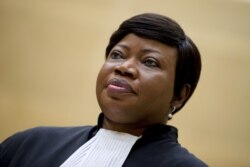Member states of the International Criminal Court have elected British human rights lawyer Karim Khan to a nine-year term as the tribunal’s next chief prosecutor.
After two rounds of voting Friday at the U.N. General Assembly in New York, Khan beat out three other candidates to become The Hague-based court’s third prosecutor. The leader after the first round of votes, Khan secured 72 of 123 votes cast in the second round. A simple majority of 62 votes was needed to prevail.
He beat out Spain's Carlos Castresana Fernandez, Fergal Gaynor of Ireland and Francesco Lo Voi of Italy.
Khan has represented governments, heads of state, political leaders, military officers and victims before all the international criminal courts.
In 2018, U.N. Secretary-General Antonio Guterres appointed him as special adviser to head up a new team investigating atrocity crimes allegedly committed by Islamic State fighters in Iraq, including against minority Yazidis.
Khan will take over from Chief Prosecutor Fatou Bensouda on June 16, when her nine-year term ends.
Bensouda, a native of Gambia, has been a tenacious prosecutor, going after African warlords and world powers alike. She incurred the wrath of the Trump administration in the United States for investigating alleged war crimes carried out by American troops in Afghanistan and for opening an investigation into Israel’s treatment of the Palestinians.
The Trump administration responded by revoking Bensouda’s U.S. visa and later imposing an asset freeze and entry ban on her and another ICC official. The new Biden administration has indicated it will review the sanctions but has not moved to cancel the Trump-era executive order that imposed them. The U.S. is not a member of the court.
The court was established in 1998 and began hearing cases in 2002, after 60 countries had ratified the Rome Statute. Today, 123 nations are members.
“We welcome the election of Karim Khan as the next ICC prosecutor and look forward to working with him to deliver justice to victims of international crimes, including survivors of sexual and gender-based violence,” said Akila Radhakrishnan, president of the Global Justice Center. “Prosecutor Bensouda has taken important steps to center a gender perspective and approach to the work of the prosecutor’s office, and we hope that Prosecutor Khan will continue to build on this legacy.”
Liz Evenson, associate international justice director at Human Rights Watch, said Khan’s election comes at a moment when “the court is needed more than ever” but faces both internal performance issues and external pressure.
“We will be looking to Karim Khan to tackle the failings, while demonstrating firm independence to hold even the most powerful to account,” Evenson said. “In situations scarred by the most awful crimes around the globe, including Afghanistan, Central African Republic, Libya and Palestine, the ICC is a critical path to justice for victims.”
The ICC investigates and tries individuals charged with the gravest crimes of concern to the international community: genocide, war crimes, crimes against humanity and the crime of aggression. To date, 30 cases have been brought before the ICC. The judges have issued nine convictions and four acquittals.





